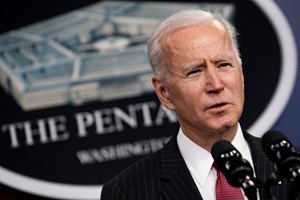Water lobbyists urge Biden administration to loosen ‘Buy America’ law requirements
(UC) — The biggest water advocacy groups in the country are pleading with the Biden administration to provide project developers a two-year exception from "Buy America" criteria, stating that failure to do so will result in a ban on government funding for infrastructure, E&E News reported.
The White House has justified the policy as being essential for increasing domestic production and generating high-paying union jobs. However, the water infrastructure sector has warned that the rules throw a wrench in its sector and could thwart attempts by industry members to create projects meant to combat climate change, provide safe drinking water, handle sewage, and safeguard the public.
“These new, across-the-board domestic content requirements present an unprecedented opportunity to support good-paying construction and manufacturing jobs while strengthening our industrial base and promoting American innovation for years to come,” the White House Office of Management and Budget stated according to E&E news.
The elements of last year's bipartisan infrastructure package, technically referred to as the Infrastructure Investment and Jobs Act, that mandate that manufacturers employ American suppliers, with rare and precise exceptions, are in contention.
The bill reflects a growing political trend in the U.S. to give preference to American-made goods. Former President Donald Trump reportedly supported "Made in America" programs, despite the fact that certain Democratic lawmakers have long defended the bill.
Several sectors — specifically the water infrastructure industry — emphasize that some of their crucial components are not currently produced in the United States.
“Since President Biden signed the law ten months ago, a clear understanding on how the various departments and agencies will implement the requirements does not exist,” a host of water trade groups and tech companies told EPA Administrator Michael Regan and Biden’s “infrastructure czar,” Mitch Landrieu, in a letter in September, according to E&E news.
Regan and Landrieu were forewarned by more than a dozen organizations and businesses, including the American Water Works Association and the National Association of Clean Water Agencies, or NACWA, that operators of drinking water and wastewater systems depend on foreign-made technology to meet federal water quality requirements.
They are pleading with the administration to extend the deadline for developers to adhere to the rules mandating that they exclusively utilize domestically sourced materials.
The Department of Transportation temporarily waived the "Buy America" requirement for the electric vehicle industry due to supply chain issues, according to a talking point among water groups.
The challenges the "Buy America" provisions pose to the water sector are a "big deal," Kristina Surfus, managing director of government affairs at NACWA, told E&E news. She noted that infrastructure dollars — and thus the requirements — are flowing into a variety of programs, including state revolving funds, programs like the Water Infrastructure Finance and Innovation Act at EPA, as well as regional programs from the Great Lakes to the Chesapeake Bay and the Everglades.
The "Buy America" rule that's upsetting the business requires that recipients of federal grants, loans, and other funds must utilize equipment made in the United States, even though certain equipment is only made elsewhere. It was included in the bipartisan infrastructure law.
These could be high-speed turbo and other blowers, motors, smart meters, sensors, and actuators, particular kinds of pumps, ultraviolet technologies, membranes and membrane bioreactors, reverse osmosis system equipment and piping, ozone treatment, monitors, data analysis, and other smart technologies, and particular adsorbent media, including PFAS removal best available technologies.
According to Surfus, the industry as a whole is not opposed to the rules, but the White House needs to be more accommodating and issue guidelines that makes it clear how project developers may abide by what can be complicated mandates.
She said that after meeting with EPA to discuss how to implement the "Buy America" provisions, water advocacy groups like NACWA are now anticipating the release of "domestic content" guidance from the Office of Management and Budget, which will outline how developers can certify their compliance with the rule.
Surfus also mentioned that last summer, the Environmental Protection Agency (EPA) authorized and finalized a waiver for project applicants seeking funding from state revolving funds, which are pools of money for water projects getting infrastructure funding. She clarified, however, that the waiver only applies to initiatives that were already under way when the "Buy America" clause became effective in May.
Related News
From Archive

- Glenfarne Alaska LNG targets late-2026 construction start for 807-mile pipeline project
- U.S. water reuse boom to fuel $47 billion in infrastructure spending through 2035
- $2.3 billion approved to construct 236-mile Texas-to-Gulf gas pipeline
- Major water pipe break in Puerto Rico hits over 165,000 customers
- Potomac River Tunnel project enters construction phase beneath Washington, D.C.
- Pennsylvania American Water launches interactive map to identify, replace lead water service lines
- Trump's tariffs drive $33 million cost increase for Cincinnati sewer project
- Utah city launches historic $70 million tunnel project using box jacking under active rail line
- Tulsa residents warned after sewer lines damaged by boring work
- Fatal trench collapse halts sewer construction in Massachusetts; two workers hospitalized




Comments